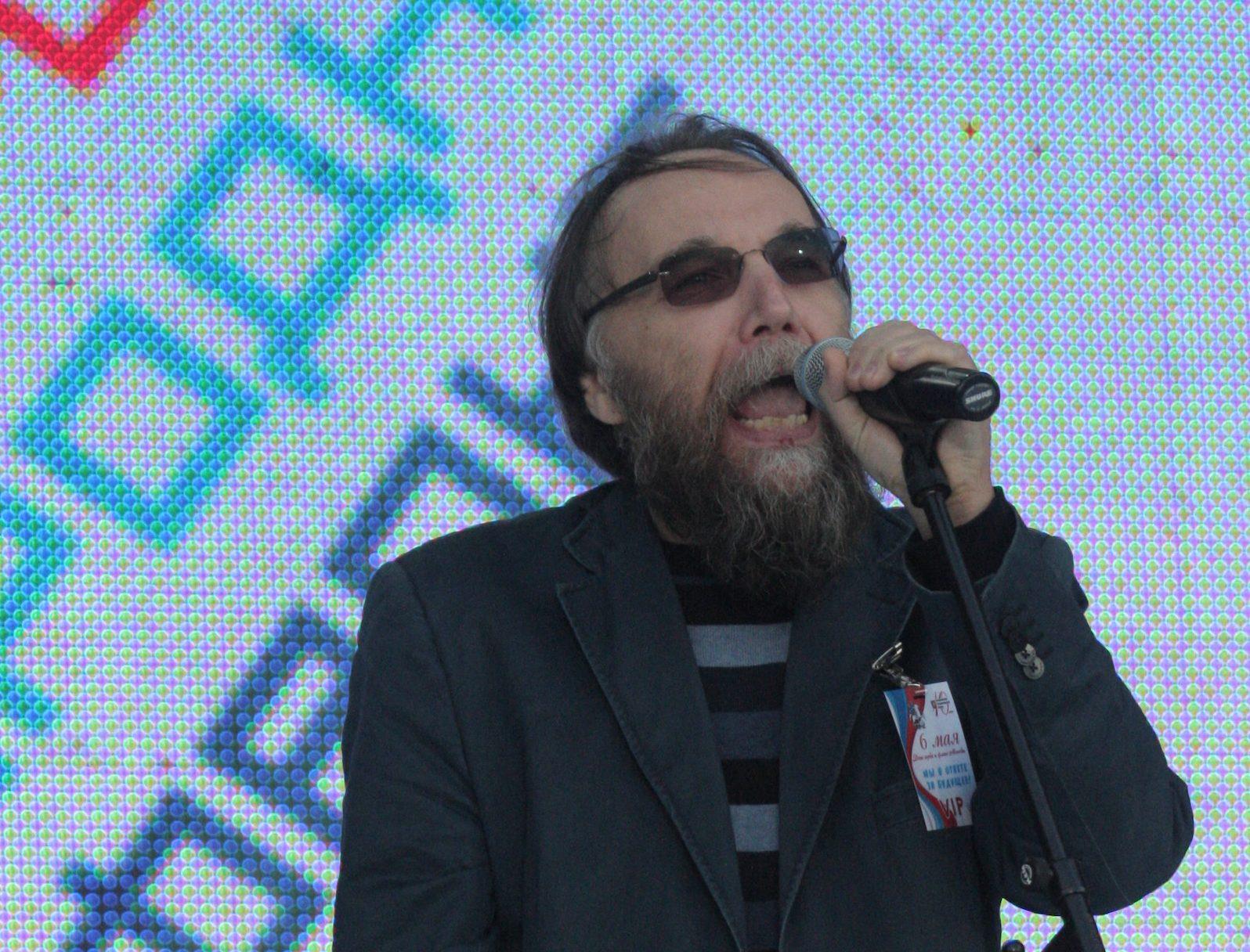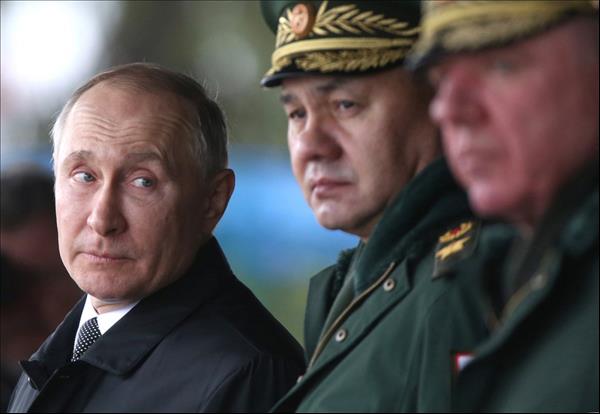
Russia Is Fighting Three Undeclared Wars
Now entering its seventh month , Vladimir Putin's war against Ukraine shows no sign of resolution.
It has become a grim battle over territory between dug-in forces, resembling the conflicts of last century instead of the complex melange of covert operations and hybrid warfare that supposedly characterize contemporary“grey zone” contests.
Both sides are playing to their strengths: Russia to its dominance in firepower , and Ukraine to its ability to corrode the invader by targeting its supply lines.
Yet this is only part of the picture. Putin is actually waging three wars, each of them undeclared. He simultaneously seeks to control Ukraine, to dominate Russia's region, and to hasten the fall of the West. And is there an internal struggle on the horizon?
Russian expansionPutin's“Special Military Operation” is an undeclared war of imperial expansion seeking to enlarge Russian territory by, as Putin himself put it , taking back“our lands.”
Depending on how we assess its war aims – which have pivoted from conquest and regime change to“protecting” the people of Donbas and back again – Russia's performance is mixed. Certainly, it has succeeded in bringing Ukraine to the brink of state failure. It has already left a reconstruction burden that will take decades to overcome.
Despite Ukrainian President Volodymyr Zelensky's perfectly understandable desire to keep fighting until all Russian invaders leave its territory, in even the most optimistic outcome for Kyiv the complete restoration of Donbas or Crimea is far from assured.
But Putin has also decimated Russia's conventional forces for surprisingly little gain in six months. Along the way, he has blunted his own rhetoric about Russian power, demonstrated a callous disregard for human rights, and revealed his armed forces to be corrupt, poorly managed, and deficient in doctrine, discipline and capabilities.
Struggle for regional primacyPutin's second undeclared war is aimed at consolidating control over a sphere of influence stretching from Central Asia to Central Europe.
It is most certainly a war: Russia destroyed Georgia's armed forces in five days during 2008 over the disputed territories of Abkhazia and South Ossetia. It has threatened Moldova with invasion if it abandons neutrality . And it has intervened with military forces in Kazakhstan , and in the conflicts between Armenia and Azerbaijan.
Putin is badly losing his struggle for regional primacy. Russia's diminishing influence relative to China – especially in Central Asia – has long been recognized. But the war against Ukraine shows just how much the Kremlin's reach has slipped.

Tajikistan and other Central Asian nations are on the fence of Russia's invasion of Ukraine. Image: Facebook / Eurasianet
Kazakhstan has called the Russian invasion a war, and sent aid to Ukraine. Moldova is actively seeking to join the EU. With the exception of Belarus, all of the states that were once part of the USSR either voted for, or abstained from, a UN General Assembly resolution deploring Russia's invasion and calling for it to withdraw its forces from Ukraine.
Putin's stated desire to prevent Ukraine from becoming an“anti-Russia” has failed utterly. Even Belarus' President Alexander Lukashenka, beholden to Putin for his political survival, has resisted attempts to lure him directly into the conflict. And the decision by Finland and Sweden to join NATO has brought the military alliance closer to Russia, lengthening its border with the alliance by some 1,300 kilometers.
War with the WestPutin's third undeclared war is his most nebulous, taking the form of a global struggle against the West, with an eye on resetting Europe's strategic map.
It has three main components:
Putin's war with the West is important for his great power vision of Russia as a Eurasian Third Rome. It also carries the most risk for those who seek to contain him. The specter of Putin running rampant in Europe under the indifferent eye of a second Trump administration should underline the urgent task of healing America's fractured society.
A looming hard winter for many Europeans will reinforce the lesson that deterrence comes with costs, as does over-dependence on resource giants who can weaponize energy for strategic leverage.
The West must also recognize that comfy rhetoric about Russia being a global pariah is untrue: there are plenty of nations sympathetic to Kremlin disinformation about NATO's historic culpability for today's events in Ukraine.
The West's future credibility also relies on how well it withstands Russian pressure at home and abroad. It will need to resist the temptation of inward-looking statism and continue supplying Ukraine with the weapons and assistance it needs. It will also need to actively counter false Russian narratives currently flooding India , Africa , and parts of South-East Asia .
Undeclared war on the horizonThe car-bomb killing of Darya Dugina, daughter of Russia's neofascist philosopher Alexander Dugin , has prompted an outpouring of bile from the Russian extreme right .
With it has come the first hint of domestic fragility in Russia since February's invasion, which saw 15,000 anti-war protesters arrested.
Both Dugin (who is neither Putin's“brain” nor his muse) and Dugina (who promoted far-right propaganda ) are bit players in Russian politics at best. However, the targeting of an ultranationalist is a rare event in Russia, where assassinations, poisonings and“accidental” deaths overwhelmingly afflict moderates.

Political scientist Aleksandr Dugin, leader of the Eurasian Movement. Photo: Sputnik via AFP / Sergey Mamontov
Russia's Federal Security Service (shortened to FSB) took a lightning-fast 36 hours before unconvincingly announcing it had cracked the case . Displaying a Ukrainian National Guard ID card (likely faked ) it claimed the perpetrator was Natalya Vovk , a member of the Azov Regiment, which Russia falsely claims to be a Nazi-dominated military unit.
According to the FSB, Vovk had moved into Dugina's apartment block, followed her for weeks, carried out the bombing, and then escaped to Estonia with her young daughter and her cat.
While we will probably never discover the true identity of Dugina's killer, any remotely plausible explanation is damaging for Russia. If Ukraine was indeed to blame, how did Russian security fail to stop Vovk at the border, since deep background checks of all Ukrainians entering the country are supposedly routine? And why was she permitted to leave?
Alternatively, if the killing was carried out by the FSB itself, was it a rogue anti-Putin faction, or acting on Putin's orders to whip up flagging support for the war? If the former, it points to a deep rift in Russia's elite. If the latter, Putin has cynically targeted Russia's ultra-right, which has criticized him for not being tough enough on Ukraine.
Finally, very few observers believe the hitherto-unknown National Republican Army , which claimed responsibility for the killing, was to blame. But if it were, then it points to the real possibility of organized domestic terrorism in Russia.
So any way you cut it, the killing of Darya Dugina brings Putin's own leadership into question. This is something he has scrupulously avoided. He is obsessed with control and enjoys the support of a massive propaganda machine to turn defeats into triumphs and blame others for his mistakes.
That's a common vehicle for autocrats to deflect criticism and has certainly worked for Putin. But unlikely though a Russian revolution from below may be, history is replete with examples – including the breakup of the Warsaw Pact and the USSR itself – where lies, repression and personalized power eventually revealed the emperor's nakedness.
So perhaps three undeclared wars are not enough for Putin. Has he just lit the spark of another, personally more dangerous one?
Matthew Sussex is Fellow, Strategic and Defence Studies Centre, Australian National University
This article is republished from The Conversation under a Creative Commons license. Read the original article .

Legal Disclaimer:
MENAFN provides the
information “as is” without warranty of any kind. We do not accept
any responsibility or liability for the accuracy, content, images,
videos, licenses, completeness, legality, or reliability of the information
contained in this article. If you have any complaints or copyright
issues related to this article, kindly contact the provider above.

















Comments
No comment